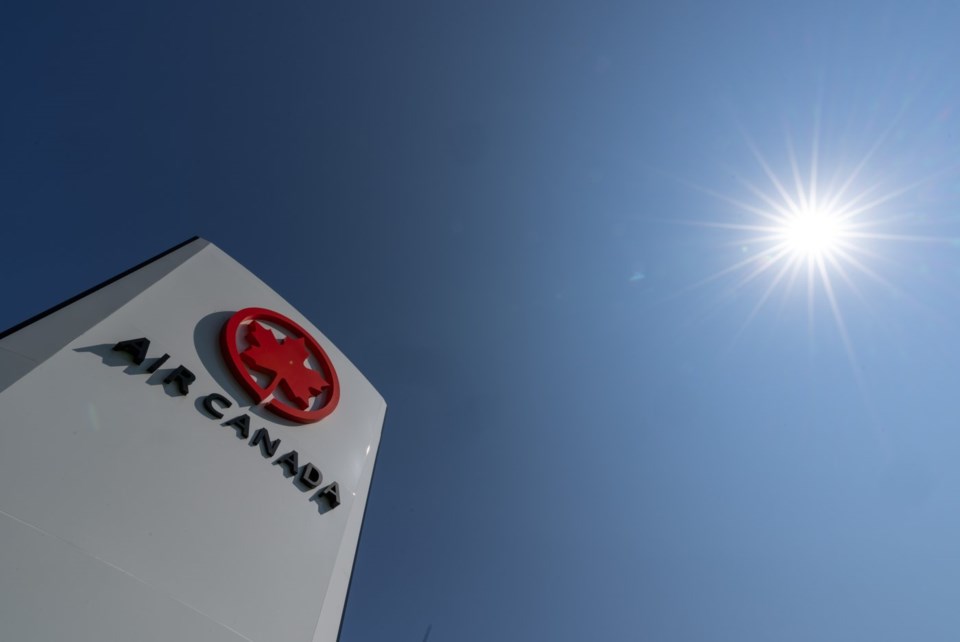MONTREAL — Air Canada pilots have given the green light to a tentative agreement with the airline, dashing fears of a future strike and overcoming concerns about entry-level pay and quality-of-life provisions.
The Air Line Pilots Association said Thursday its members voted 67 per cent in favour of the deal, allowing management and passengers to breathe easier.
The agreement grants the carrier's roughly 5,400 pilots a cumulative wage hike of nearly 42 per cent over four years.
The increase outstrips major gains won last year by pilots at the three biggest U.S. airlines, where pay bumps ranged between 34 and 40 per cent — though they started from a higher baseline.
Despite the eye-popping top-line figure, the one-third of ballots cast against the agreement reveal ongoing divides over issues such as scheduling, quality of life and a large pay gap between newer employees and more experienced flight crews.
"It does show that there's room for improvement," said Charlene Hudy, who chairs the union's Air Canada contingent. "There's a contingent of my pilots right now who clearly may not agree with me.
"It is not a perfect agreement," she told reporters on a conference call.
Nonetheless, Hudy stressed that it amounts to the biggest labour contract in the company's 87-year history, adding $1.9 billion in value to the previous deal.
"We pushed Air Canada as far as we could push them to extract as much value as possible."
The country's largest airline also welcomed the thumbs-up from pilots.
"The agreement is mutually beneficial and it will keep our pilots the best compensated in Canada and provide the work-life balance improvements they were seeking. At the same time, the agreement gives our company flexibility and creates a framework for future growth of the airline and its network," said chief executive Michael Rousseau in a release.
The tentative contract, hammered out on Sept. 14 in a late-night session at a hotel near Toronto's Pearson airport after more than a year of negotiations, averted a strike that would have seen some 670 flight cancellations and 110,000 passengers affected daily.
Over the past few weeks, the union held roadshows to pitch the would-be deal to members.
Hudy warned her colleagues in a virtual town hall last month that she would "have no choice but to resign" if they opted to reject the agreement, raising the stakes as aviators mulled whether to accept the salary gains or try to drive an even harder bargain. The Canadian Press obtained a copy of her statement and confirmed it with two pilots.
A global pilot shortage, a desire to maintain bookings and a federal government warning that it would not intervene in a work stoppage all factored into greater bargaining leverage for the union than it could muster during talks a decade earlier, said Jacques Roy, a professor of transport management at HEC Montreal business school.
“Probably Air Canada figured that they would be better off giving the raise and buying some tranquility, some stability in their operations, even though this means their operating costs will increase," he said.
The previous agreement provided wage hikes of two per cent per year over a period of 10 years.
About 99 per cent of eligible pilots cast ballots in the ratification vote, the union said Thursday.
The contract goes into effect immediately, retroactive to September 2023 and expiring on Sept. 29, 2027.
Pilots will see a 26 per cent wage bump for the fiscal year just passed and a hike of four per cent in each of 2024, 2025 and 2026.
However, under both the new and previous agreements, pilots earn far less in their first four years at the company before enjoying a big wage hike starting in year five.
Some employees had been pushing to fully scrap the so-called “fixed rate” provision, where earnings stay flat regardless of the type of aircraft flown. (Typically, wages increase with the size of the plane.) The freshly inked deal would merely cut the four-year period of lower pay to two years, according to a copy of the contract obtained by The Canadian Press.
Even in years three and four, wages would be substantially lower than in year five. The hourly rate jumps by nearly 40 per cent in the fifth year, a far greater leap than in any other period, the agreement shows.
On the assumption that pilots work roughly 75 hours per month — a common baseline in the industry — newer recruits will now earn between $75,700 and $134,000 versus almost $187,000 in year five, and more than $367,000 for an experienced captain flying a Boeing 777.
Experts say well over a third of the carrier’s roughly 5,200 active pilots may currently be earning entry-level wages following a recent hiring surge. Many come on board after lengthy careers at other airlines, rather than straight out of flight school.
Hudy acknowledged that so-called junior pilots earn lower wages at Air Canada than at some other domestic carriers, but said that when pensions, per diems and other compensation are taken into account, "we are the best-paid pilots in Canada."
Negotiations on another contract will kick off in two and a half years, she added.
This report by The Canadian Press was first published Oct. 10, 2024.
Companies in this story: (TSX:AC)
Christopher Reynolds, The Canadian Press




